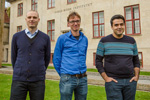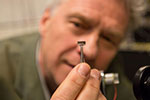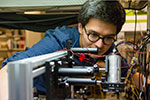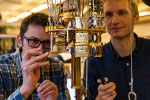News on Quantum physics in 2015
Photons open the gateway for quantum networks
23 October 2015
 There is tremendous potential for new information technology based on light (photons), and quantum technology based on photons – called quantum photonics, will be able to hold much more information than current computer technology.
There is tremendous potential for new information technology based on light (photons), and quantum technology based on photons – called quantum photonics, will be able to hold much more information than current computer technology.
Quantum networks: Back and forth are not equal distances!
27 July 2015
 Researchers from the Niels Bohr Institute have discovered a new type of photonic channels, where back and forth are not equal distances! Such a system has been a missing component for building quantum photonic circuits on a large
Researchers from the Niels Bohr Institute have discovered a new type of photonic channels, where back and forth are not equal distances! Such a system has been a missing component for building quantum photonic circuits on a large
Super sensitive measurement of magnetic fields in swinging atoms
30 March 2015
 There are electrical signals in the nervous system, the brain and throughout the human body and there are tiny magnetic fields associated with these signals that could be important for medical science.
There are electrical signals in the nervous system, the brain and throughout the human body and there are tiny magnetic fields associated with these signals that could be important for medical science.
Quantum link between QDev in Denmark and QuTech in Holland
17 March 2015
 The Center for Quantum Devices, QDev at the Niels Bohr Institute at the University of Copenhagen and QuTech at Delft University of Technology in Holland have therefore entered into an international partnership in the research
The Center for Quantum Devices, QDev at the Niels Bohr Institute at the University of Copenhagen and QuTech at Delft University of Technology in Holland have therefore entered into an international partnership in the research
Quantum mechanic frequency filter for atomic clocks
6 March 2015
 In an atomic clock, electrons jumping from one orbit to another decides the clock’s frequency. To get the electrons to jump, researchers shine light on the atoms using stabilised laser light. However, the laser light has to have a very
In an atomic clock, electrons jumping from one orbit to another decides the clock’s frequency. To get the electrons to jump, researchers shine light on the atoms using stabilised laser light. However, the laser light has to have a very
New superconducting hybrid crystals developed at the University of Copenhagen
12 January 2015
 A new type of ‘nanowire’ crystals that fuses semiconducting and metallic materials on the atomic scale could lay the foundation for future semiconducting electronics. Researchers at the University of Copenhagen are behind
A new type of ‘nanowire’ crystals that fuses semiconducting and metallic materials on the atomic scale could lay the foundation for future semiconducting electronics. Researchers at the University of Copenhagen are behind
